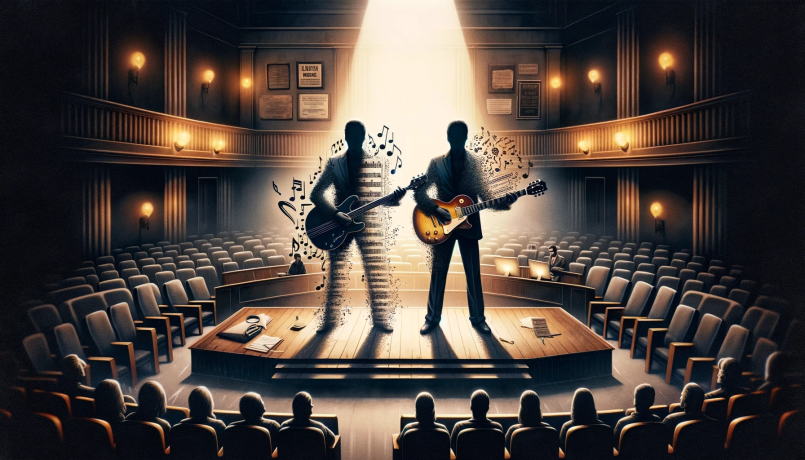
The iconic music duo Hall & Oates are embroiled in a legal battle due to the absence of a formal business agreement. This case highlights the importance of structured partnerships in the music industry and beyond.
by LawInc Staff
November 28, 2023
Music fans were stunned this week when news emerged that famed Hall & Oates singer Daryl Hall filed a restraining order against his partner of over 50 years, John Oates.
While full details remain confidential, the legal action signals major conflict between the pop duo behind enduring hits like “Rich Girl” and “Maneater.”
#Halloween without “Maneater”? As if we would do that. pic.twitter.com/1kQUyqwDBJ
— Daryl Hall & John Oates (@halloates) October 31, 2022
On the surface throughout their career, Hall & Oates presented as one of music’s most affable, fruitful creative relationships. But their unfolding legal battle highlights why even seemingly aligned partnerships greatly benefit from formalized business agreements early on.
Lack of Written Partnership Agreement Comes Back to Bite
When Hall and Oates first teamed up as Philadelphia teenagers in 1967, business partnership agreements were likely the furthest things from their minds. They set out on a passion project, not envisioning their rise to becoming the most commercially successful duo act in pop chart history.
But after garnering six #1 Billboard singles, over 60 million albums sold globally, and getting inducted into the Rock & Roll Hall of Fame, ambiguity around their business interests has now bred destabilizing conflict.
While the restraining order’s specifics are sealed, it suggests quarrels over financial splits, creative credits, decision-making power, and other disputes common when partners have a contentious falling out without contractual guardrails in place.
Lessons for All Business Partners, Old and New
Had Hall & Oates invested early on in either an Operating Agreement as an LLC or a formal Partnership Agreement, much of this mess could have been avoided. These contracts allow partners to preemptively lay out provisions including:
Ownership Percentage Splits: Clearly defining each partner’s proportional ownership share in the business based on respective investments and contributions.
Profit/Loss Distribution: Setting terms for how net profits & losses will be divided among partners (often aligned to ownership%).
“Buy-Sell” Clauses: Establishes a process for the departing partner to sell their share and the remaining partner(s) to buy them out.
Decision Making Hierarchy & Governance: Delineates management roles and which actions require consensus vs majority vote vs unilateral decisions.
Dispute Resolution Mechanisms: Defines mediation, arbitration, or other methods to resolve internal disputes without immediately resorting to lawsuits.
Dissolution Terms & Asset/Liability Distribution: Lays out the process for winding down ops and distributing assets/liabilities upon termination of the partnership.
By proactively defining these expectations in writing, business partners establish fair guides and procedures to handle changes down the road – whether executed amicably or antagonistically.
While exciting in early stages, founding partners often avoid addressing worst-case scenarios like dissolution. But interpersonal conflicts or shifting priorities can inevitably emerge even between formerly close allies.
Just look at Mark Zuckerberg and his co-founders Eduardo Saverin and others from Facebook’s early days. Their lack of written shareholder agreements led years later to prolonged legal nightmares.
Emotional Fallout Accompanies Legal Implications
The emotional weight of Hall & Oates’ apparent split accompanies its legal and financial implications. For over 50 years, Hall and Oates presented an image of steadfast loyalty and camaraderie anchored in their shared musical brilliance.
This public reveal of behind-the-scenes divisions catches longtime fans off guard. It affirms the need for nurturing communication and structured expectations in any relationship to withstand the volatility of fame, creative collaboration, personal changes over decades.
Formal Business Structures Prevent Messy Dissolutions
As this story continues unfolding, broader lessons emerge on formally building business partnerships early on to mitigate fallout later down the road. Hall & Oates serve as a prime case study showing how formal operating contracts establish order amidst internal chaos. Their decades of accrued partnership profits are now likely going towards legal fee expenditures instead of their own pockets.
Perhaps if more aspiring young duos understood these risks, they would visit a business lawyer before buying their first guitar or booking studio time. Protecting creative and financial interests from the get-go allows room for sustainable growth.
LLCs, Corporations Shield Personal Assets Too
For modern businesses, forming limited liability companies (LLCs) or corporations institutionalizes that protection. LLCs and corporations distinguish between business and personal assets, preventing individual founders from risks beyond their investment. In an LLC Operating Agreement or corporate By-Laws, partners can define their ownership rights.
LLCs also require less paperwork than the corporate structure, while still formalizing crucial business agreements between stakeholders. Even solo entrepreneurs gain advantages by structuring as an LLC or corporation. And funding sources such as banks or investors may require these formal entities for financing eligibility anyway.
Calling All Present and Future Business Partners
As Daryl Hall and John Oates continue addressing their fractured relationship while the public mourns the rift of an iconic pop music partnership, larger takeaways emerge on preventing partnership fallout.
Over decades, a lack of written understanding around ownership and decision-making eroded their bond. Emotions and misaligned financial incentives bred a court battle that could have started off as an Operating Agreement discussion.
The days of handshake agreements once sufficed when Hall & Oates started their career just after the “Summer of Love.” But as business partnerships grow in assets and ambition, it becomes far messier to address structural issues down the line. Today’s tech startups have learned from examples like Facebook to embed these agreements into company DNA on Day 1.
For any existing or aspiring creative collaborators, business partners, startup founders, and beyond searching for long-term success, heed cautionary tales like Hall v. Oates. Then work with an attorney to build the binding frameworks meant to weather every storm on the horizon – artistic or otherwise.
Need Legal Help? Contact Us
If you are launching a new business venture, ensure everything is done correctly to prevent issues down the line. Contact us to see how we can help.
Also See:













